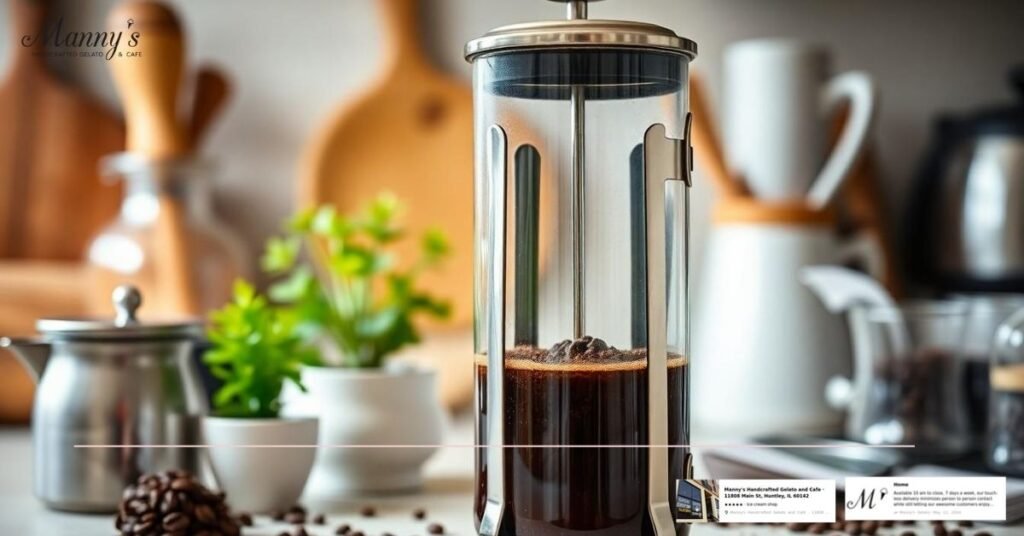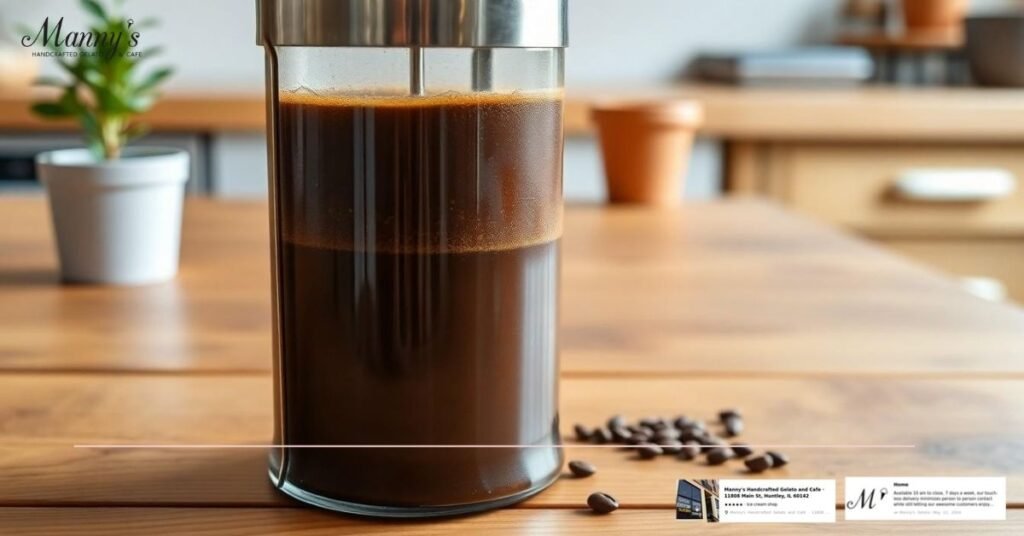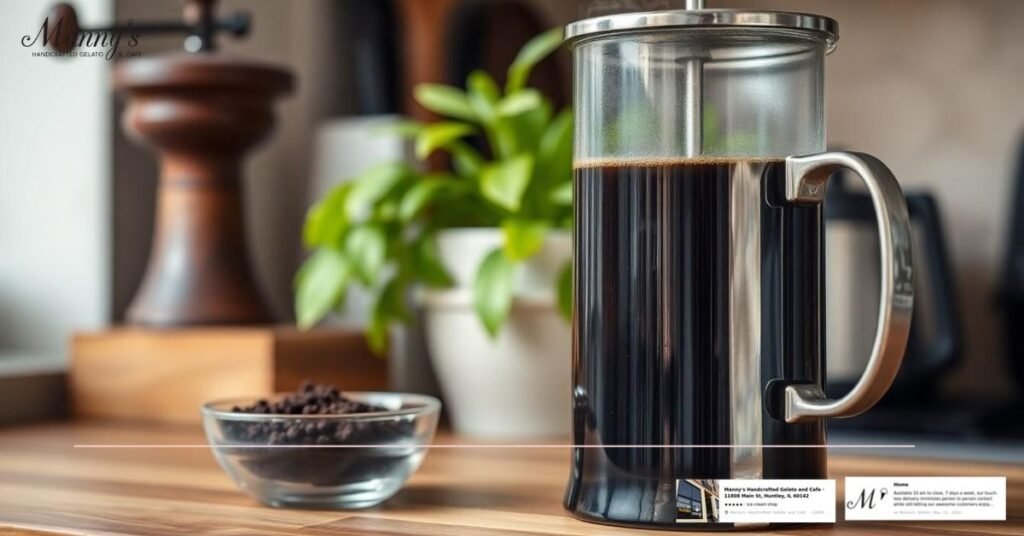- Reusing coffee grounds in a French press results in weaker flavor, lower caffeine content, and diminished overall quality, leading to a less satisfying cup.
- Spent grounds may lead to over-extraction in the second brew, causing bitterness, sourness, and thinner texture in the coffee.
- Leaving wet grounds unrefrigerated increases the risk of mold or bacterial contamination, making proper storage essential for safety.
- While reusing coffee grounds offers minor cost savings and reduces waste, the compromises in taste and quality might outweigh the benefits for coffee enthusiasts.
- Used coffee grounds are better repurposed for eco-friendly uses, such as composting, fertilizing plants, or creating DIY beauty and cleaning products.
- Frequent reuse of grounds can lead to residue buildup, potentially causing wear and tear on your French press equipment over time.
We’ve all been there—staring at the used coffee grounds in our French press and wondering if there’s still some life left in them. After all, coffee isn’t exactly cheap, and the idea of squeezing out a second cup from the same grounds feels like a win. But does reusing coffee grounds actually work, or are we just setting ourselves up for a disappointing brew?
It’s a question that sparks curiosity, especially for those of us who love coffee and hate waste. While the idea might seem practical, there’s more to consider than just saving a few bucks. Let’s dive into whether reusing coffee grounds in a French press is worth it and what we can expect from that second brew.
What Happens When You Reuse Coffee Grounds?
Reusing coffee grounds in a French press can lead to noticeable changes in the resulting brew. These changes affect taste, caffeine levels, and overall quality.
Impact On Flavor
When coffee grounds are reused, the flavor becomes significantly weaker. The first brew extracts the majority of the oils and soluble compounds responsible for the robust taste. A second brew often lacks complexity and results in a flat or diluted flavor profile. For example, you might find the notes of chocolate or fruit in the first brew practically nonexistent in the second.
Changes In Caffeine Content
The caffeine content decreases when grounds are reused. Most of the caffeine is extracted during the initial brewing process, leaving only trace amounts for subsequent uses. A second cup brewed from the same grounds would contain a noticeably lower level of caffeine, making it a less energizing option.
Effects On Texture And Quality
The texture and quality of the coffee degrade after reusing grounds. Spent coffee grounds become oversaturated, leading to over-extraction in a second brew. This over-extraction can make the coffee taste bitter or slightly sour, while the texture may feel thinner or less smooth compared to the first brew. Additionally, any sediment present during the second brew might increase, impacting the mouthfeel.
Is It Safe To Reuse Coffee Grounds In A French Press?

Reusing coffee grounds in a French press isn’t considered ideal for safety and quality. While not inherently unsafe, certain factors can influence the health risks and overall experience.
Health Considerations
Reused coffee grounds contain significantly fewer oils, flavor compounds, and caffeine. This depletion impacts quality and may reduce the functional benefits coffee typically provides. Individuals relying on caffeine for energy might find the reduced content less effective. Additionally, the degraded grounds can produce a more bitter or unpleasant brew, which may irritate sensitive stomachs.
Mold And Contamination Risks
Wet coffee grounds create a humid environment that encourages mold or bacterial growth if left unrefrigerated. French press grounds reused after sitting for hours or overnight risk contamination. Brewing with compromised grounds could introduce harmful microorganisms into the cup, especially without proper storage.
Benefits Of Reusing Coffee Grounds

Reusing coffee grounds offers certain advantages, primarily focusing on cost savings and environmental benefits. However, these benefits may come with limitations based on preferences and context.
Cost-Effectiveness
Reusing coffee grounds in a French press can reduce costs slightly by extending the use of the same grounds for another brew. For individuals with tight budgets or those who consume large quantities of coffee, this could offer small savings over time. However, achieving meaningful cost reduction may not outweigh the compromise in flavor or caffeine content, especially for coffee enthusiasts who value quality over budget.
Environmental Impact
Repurposing coffee grounds helps minimize waste, an essential step toward eco-friendly living. By using grounds multiple times before disposal, we lower the volume of organic material that ends up in landfills. Additionally, while the second brew might not be ideal for drinking, reused grounds can be diverted for other sustainable purposes, such as composting, fertilizing plants, or even as a natural scrub. This approach aligns with efforts to reduce waste and repurpose materials efficiently.
Drawbacks Of Reusing Coffee Grounds
Reusing coffee grounds in a French press might seem economical, but it impacts the overall coffee experience. Several drawbacks make it less enjoyable and potentially problematic.
Diminished Taste
The most noticeable issue is the loss of flavor. Most of the flavorful oils and compounds are extracted during the first brew, leaving the grounds depleted of their rich notes. A second brew often results in a weak, bland cup with an imbalanced and bitter taste. For example, vibrant acidity and aromatic notes become almost nonexistent after the initial extraction. The first brew captures the majority of the coffee’s essence, making any subsequent brew considerably less satisfying.
Equipment Wear And Tear
Reusing coffee grounds can also affect your French press over time. Saturated grounds tend to form a thicker, stickier residue that’s harder to clean, increasing wear on the filter and plunger. Frequent exposure to this residue can reduce the longevity of your equipment and make maintenance more tedious.
Creative Alternative Uses For Used Coffee Grounds

Used coffee grounds may not be ideal for another brew, but they can find new life in sustainable and practical applications. Repurposing them reduces waste and adds value to everyday tasks.
Homemade Compost and Fertilizer
Coffee grounds serve as a rich source of nitrogen for compost piles, which promotes microbial activity essential for decomposition. Adding them to a compost bin enhances the nutrient profile and helps produce fertile, high-quality soil. In gardens, spreading used grounds around plants, such as roses or tomatoes, improves soil structure and provides trace amounts of phosphorus, potassium, and magnesium. To avoid over-acidifying the soil, mix the grounds evenly with other organic matter.
DIY Beauty and Cleaning Products
The coarse texture of coffee grounds makes them an excellent natural exfoliant. Mixing them with coconut oil or honey creates an effective scrub for removing dead skin cells and improving circulation. As a deodorizer, dried coffee grounds neutralize odors when placed in refrigerators or shoes. Additionally, grounds can scrub greasy surfaces or clean pots and pans, replacing chemical-based cleaning solutions for a more organic option.
Conclusion
Reusing coffee grounds in a French press might seem like a clever way to stretch your resources, but it comes with noticeable trade-offs in flavor, quality, and caffeine content. While it’s not the most satisfying option for your next cup, there are plenty of creative ways to repurpose used grounds that are both practical and eco-friendly.
Whether you’re looking to save a little money or reduce waste, it’s all about finding the balance that works for you. At the end of the day, coffee grounds can still serve a purpose—even if it’s not in your mug.
Frequently Asked Questions
Can I reuse French press coffee grounds for a second brew?
Yes, you can reuse coffee grounds from a French press, but the results will be noticeably different. The second brew will have a weaker flavor, less caffeine, and a thinner texture. It’s possible for cost-saving or environmental reasons, but it won’t match the quality of the first cup.
Does reusing coffee grounds affect the flavor of the second brew?
Yes, the flavor of the second brew will be significantly weaker and less complex. Most of the flavorful oils and compounds are extracted during the first brewing, leaving the second cup bland and sometimes bitter.
Is it safe to reuse French press coffee grounds?
Reusing coffee grounds is generally safe, but wet grounds can encourage mold or bacterial growth if left out too long. To avoid contamination, store used grounds in the fridge and reuse them quickly.
Does reusing coffee grounds reduce caffeine content?
Yes. Reused coffee grounds have much lower caffeine levels since most of the caffeine is extracted during the first brew. The second cup will be less energizing.
What are the environmental benefits of reusing coffee grounds?
Reusing coffee grounds reduces waste and minimizes the organic material sent to landfills. Even if not used for a second brew, grounds can be repurposed for composting, fertilizing plants, or as a natural cleaning agent.
How should I store coffee grounds if I plan to reuse them?
Store used coffee grounds in an airtight container in the refrigerator to prevent mold or bacterial growth. Avoid leaving them at room temperature for extended periods.
Can reusing coffee grounds damage my French press?
Yes, reusing overly saturated grounds can create sticky residue that’s harder to clean, potentially causing wear and tear on your French press over time.
What are some creative uses for used coffee grounds?
Used coffee grounds can be repurposed as compost, plant fertilizer, natural exfoliants in beauty products, odor neutralizers, or abrasive cleaners for scrubbing surfaces. These alternatives promote sustainability and reduce waste.
Why does the second brew often taste bitter?
The bitterness in the second brew comes from over-extraction. Residual compounds in the grounds may lead to an imbalanced and unpleasant flavor after being reused.
Should I reuse coffee grounds purely for cost savings?
Reusing coffee grounds can save money, but the reduced flavor, caffeine content, and quality may not justify it for avid coffee drinkers. It’s a trade-off between cost and taste.
